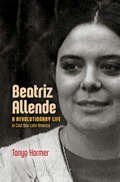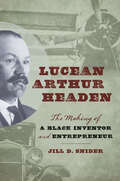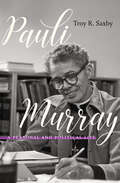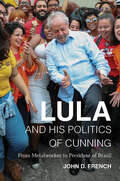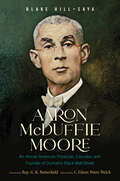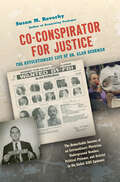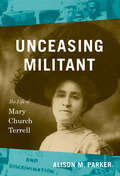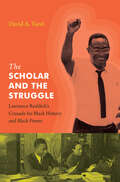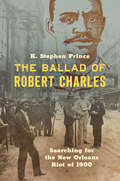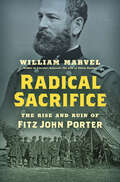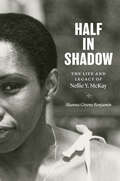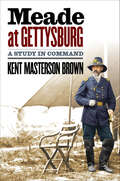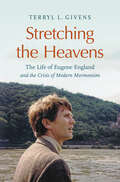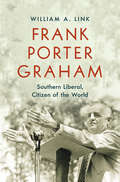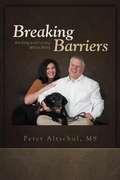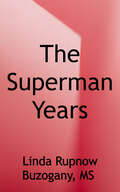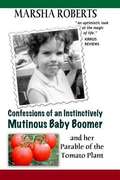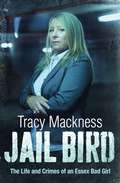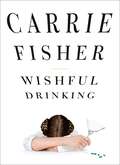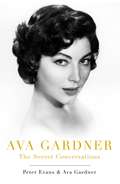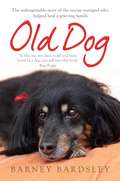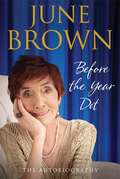- Table View
- List View
Beatriz Allende: A Revolutionary Life in Cold War Latin America
by Tanya HarmerThis biography of Beatriz Allende (1942–1977)—revolutionary doctor and daughter of Chile's socialist president, Salvador Allende—portrays what it means to live, love, and fight for change. Inspired by the Cuban Revolution, Beatriz and her generation drove political campaigns, university reform, public health programs, internationalist guerrilla insurgencies, and government strategies. Centering Beatriz's life within the global contours of the Cold War era, Tanya Harmer exposes the promises and paradoxes of the revolutionary wave that swept through Latin America in the long 1960s.Drawing on exclusive access to Beatriz's private papers, as well as firsthand interviews, Harmer connects the private and political as she reveals the human dimensions of radical upheaval. Exiled to Havana after Chile's right-wing military coup, Beatriz worked tirelessly to oppose dictatorship back home. Harmer's interviews make vivid the terrible consequences of the coup for the Chilean Left, the realities of everyday life in Havana, and the unceasing demands of solidarity work that drained Beatriz and her generation of the dreams they once had. Her story demolishes the myth that women were simply extras in the story of Latin America's Left and brings home the immense cost of a revolutionary moment's demise.
Lucean Arthur Headen: The Making of a Black Inventor and Entrepreneur
by Jill D. SniderBorn in Carthage, North Carolina, Lucean Arthur Headen (1879–1957) grew up amid former slave artisans. Inspired by his grandfather, a wheelwright, and great-uncle, a toolmaker, he dreamed as a child of becoming an inventor. His ambitions suffered the menace of Jim Crow and the reality of a new inventive landscape in which investment was shifting from lone inventors to the new "industrial scientists." But determined and ambitious, Headen left the South, and after toiling for a decade as a Pullman porter, risked everything to pursue his dream. He eventually earned eleven patents, most for innovative engine designs and anti-icing methods for aircraft. An equally capable entrepreneur and sportsman, Headen learned to fly in 1911, manufactured his own "Pace Setter" and "Headen Special" cars in the early 1920s, and founded the first national black auto racing association in 1924, all establishing him as an important authority on transportation technologies among African Americans. Emigrating to England in 1931, Headen also proved a successful manufacturer, operating engineering firms in Surrey that distributed his motor and other products worldwide for twenty-five years.Though Headen left few personal records, Jill D. Snider recreates the life of this extraordinary man through historical detective work in newspapers, business and trade publications, genealogical databases, and scholarly works. Mapping the social networks his family built within the Presbyterian church and other organizations (networks on which Headen often relied), she also reveals the legacy of Carthage's, and the South's, black artisans. Their story shows us that, despite our worship of personal triumph, success is often a communal as well as an individual achievement.
Pauli Murray: A Personal and Political Life
by Troy R. SaxbyThe Rev. Dr. Anna Pauline "Pauli" Murray (1910–1985) was a trailblazing social activist, writer, lawyer, civil rights organizer, and campaigner for gender rights. In the 1930s and 1940s, she was active in radical left-wing political groups and helped innovate nonviolent protest strategies against segregation that would become iconic in later decades, and in the 1960s, she cofounded the National Organization for Women (NOW). In addition, Murray became the first African American to receive a Yale law doctorate and the first black woman to be ordained an Episcopal priest. Yet, behind her great public successes, Murray battled many personal demons, including bouts of poor physical and mental health, conflicts over her gender and sexual identities, family traumas, and financial difficulties. In this intimate biography, Troy Saxby provides the most comprehensive account of Murray's inner life to date, revealing her struggles in poignant detail and deepening our understanding and admiration of her numerous achievements in the face of pronounced racism, homophobia, transphobia, and political persecution. Saxby interweaves the personal and the political, showing how the two are always entwined, to tell the life story of one of twentieth-century America's most fascinating and inspirational figures.
Lula and His Politics of Cunning: From Metalworker to President of Brazil
by John D. FrenchKnown around the world simply as Lula, Luis Inacio Lula da Silva was born in 1945 to illiterate parents who migrated to industrializing Sao Paulo. He learned to read at ten years of age, left school at fourteen, became a skilled metalworker, rose to union leadership, helped end a military dictatorship—and in 2003 became the thirty-fifth president of Brazil. During his administration, Lula led his country through reforms that lifted tens of millions out of poverty. Here, John D. French, one of the foremost historians of Brazil, provides the first critical biography of the leader whom even his political opponents see as strikingly charismatic, humorous, and endearing. Interweaving an intimate and colorful story of Lula's life—his love for home, soccer, factory floor, and union hall—with an analysis of large-scale forces, French argues that Lula was uniquely equipped to influence the authoritarian structures of power in this developing nation. His cunning capacity to speak with, not at, people and to create shared political meaning was fundamental to his political triumphs. After Lula left office, his opponents convicted and incarcerated him on charges of money laundering and corruption—but his immense army of voters celebrated his recent release from jail, insisting that he is the victim of a right-wing political ambush. The story of Lula is not over.
Aaron McDuffie Moore: An African American Physician, Educator, and Founder of Durham's Black Wall Street
by Blake Hill-SayaAaron McDuffie Moore (1863–1923) was born in rural Columbus County in eastern North Carolina at the close of the Civil War. Defying the odds stacked against an African American of this era, he pursued an education, alternating between work on the family farm and attending school. Moore originally dreamed of becoming an educator and attended notable teacher training schools in the state. But later, while at Shaw University, he followed another passion and entered Leonard Medical School. Dr. Moore graduated with honors in 1888 and became the first practicing African American physician in the city of Durham, North Carolina. He went on to establish the Durham Drug Company and the Durham Colored Library; spearhead and run Lincoln Hospital, the city's first secular, freestanding African American hospital; cofound North Carolina Mutual Life Insurance Company; help launch Rosenwald schools for African American children statewide; and foster the development of Durham's Hayti community. Dr. Moore was one-third of the mighty "Triumvirate" alongside John Merrick and C. C. Spaulding, credited with establishing Durham as the capital of the African American middle class in the late nineteenth and early twentieth centuries and founding Durham's famed Black Wall Street. His legacy can still be seen on the city streets and country backroads today, and an examination of his life provides key insights into the history of Durham, the state, and the nation during Reconstruction and the beginning of the Jim Crow Era.
Co-conspirator for Justice: The Revolutionary Life of Dr. Alan Berkman (Justice, Power, and Politics)
by Susan M. ReverbyAlan Berkman (1945–2009) was no campus radical in the mid-1960s; he was a promising Ivy League student, football player, Eagle Scout, and fraternity president. But when he was a medical student and doctor, his politics began to change, and soon he was providing covert care to members of revolutionary groups like the Weather Underground and becoming increasingly radicalized by his experiences at the Wounded Knee takeover, at the Attica Prison uprising, and at health clinics for the poor. When the government went after him, he went underground and participated in bombings of government buildings. He was eventually captured and served eight years in some of America's worst penitentiaries, barely surviving two rounds of cancer. After his release in 1992, he returned to medical practice and became an HIV/AIDS physician, teacher, and global health activist. In the final years of his life, he successfully worked to change U.S. policy, making AIDS treatment more widely available in the global south and saving millions of lives around the world.Using Berkman's unfinished prison memoir, FBI records, letters, and hundreds of interviews, Susan M. Reverby sheds fascinating light on questions of political violence and revolutionary zeal in her account of Berkman's extraordinary transformation from doctor to co-conspirator for justice.
Unceasing Militant: The Life of Mary Church Terrell (The John Hope Franklin Series in African American History and Culture)
by Alison M. ParkerBorn into slavery during the Civil War, Mary Church Terrell (1863–1954) would become one of the most prominent activists of her time, with a career bridging the late nineteenth century to the civil rights movement of the 1950s. The first president of the National Association of Colored Women and a founding member of the NAACP, Terrell collaborated closely with the likes of Frederick Douglass, Ida B. Wells, and W. E. B. Du Bois. Unceasing Militant is the first full-length biography of Terrell, bringing her vibrant voice and personality to life. Though most accounts of Terrell focus almost exclusively on her public activism, Alison M. Parker also looks at the often turbulent, unexplored moments in her life to provide a more complete account of a woman dedicated to changing the culture and institutions that perpetuated inequality throughout the United States.Drawing on newly discovered letters and diaries, Parker weaves together the joys and struggles of Terrell's personal, private life with the challenges and achievements of her public, political career, producing a stunning portrait of an often-under recognized political leader.
The Scholar and the Struggle: Lawrence Reddick's Crusade for Black History and Black Power
by David A. VarelLawrence Reddick (1910–1995) was among the most notable African American intellectuals of his generation. The second curator of the Schomburg Library and a University of Chicago PhD, Reddick helped spearhead Carter Woodson's black history movement in the 1930s, guide the Double Victory campaign during World War II, lead the Southern Christian Leadership Conference during the Cold War, mentor Martin Luther King Jr. throughout his entire public life, direct the Opportunities Industrialization Center Institute during the 1960s, and forcefully confront institutional racism within academia during the Black Power era. A lifelong Pan-Africanist, Reddick also fought for decolonization and black self-determination alongside Kwame Nkrumah, Nnamdi Azikiwe, Leopold Senghor, and W. E. B. Du Bois. Beyond participating in such struggles, Reddick documented and interpreted them for black and white publics alike.In The Scholar and the Struggle, David A. Varel tells Reddick's compelling story. His biography reveals the many essential but underappreciated roles played by intellectuals in the black freedom struggle and connects the past to the present in powerful, unforgettable ways.
The Ballad of Robert Charles: Searching for the New Orleans Riot of 1900
by K. Stephen PrinceFor a brief moment in the summer of 1900, Robert Charles was arguably the most infamous black man in the United States. After an altercation with police on a New Orleans street, Charles killed two police officers and fled. During a manhunt that extended for days, violent white mobs roamed the city, assaulting African Americans and killing at least half a dozen. When authorities located Charles, he held off a crowd of thousands for hours before being shot to death. The notorious episode was reported nationwide; years later, fabled jazz pianist Jelly Roll Morton recalled memorializing Charles in song. Yet today, Charles is almost entirely invisible in the traditional historical record. So who was Robert Charles, really? An outlaw? A black freedom fighter? And how can we reconstruct his story? In this fascinating work, K. Stephen Prince sheds fresh light on both the history of the Robert Charles riots and the practice of history-writing itself. He reveals evidence of intentional erasures, both in the ways the riot and its aftermath were chronicled and in the ways stories were silenced or purposefully obscured. But Prince also excavates long-hidden facts from the narratives passed down by white and black New Orleanians over more than a century. In so doing, he probes the possibilities and limitations of the historical imagination.
Radical Sacrifice: The Rise and Ruin of Fitz John Porter (Civil War America)
by William MarvelBorn into a distinguished military family, Fitz John Porter (1822-1901) was educated at West Point and breveted for bravery in the war with Mexico. Already a well-respected officer at the outset of the Civil War, as a general in the Union army he became a favorite of George B. McClellan, who chose him to command the Fifth Corps of the Army of the Potomac. Porter and his troops fought heroically and well at Gaines's Mill and Malvern Hill. His devotion to the Union cause seemed unquestionable until fellow Union generals John Pope and Irvin McDowell blamed him for their own battlefield failures at Second Bull Run. As a confidant of the Democrat and limited-war proponent McClellan, Porter found himself targeted by Radical Republicans intent on turning the conflict to the cause of emancipation. He made the perfect scapegoat, and a court-martial packed with compliant officers dismissed him for disobedience of orders and misconduct before the enemy. Porter tenaciously pursued vindication after the war, and in 1879 an army commission finally reviewed his case, completely exonerating him. Obstinately partisan resistance from old Republican enemies still denied him even nominal reinstatement for six more years. This revealing new biography by William Marvel cuts through received wisdom to show Fitz John Porter as he was: a respected commander whose distinguished career was ruined by political machinations within Lincoln's administration. Marvel lifts the cloud that shadowed Porter over the last four decades of his life, exposing the spiteful Radical Republicans who refused to restore his rank long after his exoneration and never restored his benefits. Reexamining the relevant primary evidence from the full arc of Porter's life and career, Marvel offers significant insights into the intersections of politics, war, and memory.
Half in Shadow: The Life and Legacy of Nellie Y. McKay
by Shanna Greene BenjaminNellie Y. McKay (1930–2006) was a pivotal figure in contemporary American letters. The author of several books, McKay is best known for coediting the canon-making Norton Anthology of African American Literature with Henry Louis Gates Jr., which helped secure a place for the scholarly study of Black writing that had been ignored by white academia. However, there is more to McKay's life and legacy than her literary scholarship. After her passing, new details about McKay's life emerged, surprising everyone who knew her. Why did McKay choose to hide so many details of her past? Shanna Greene Benjamin examines McKay's path through the professoriate to learn about the strategies, sacrifices, and successes of contemporary Black women in the American academy. Benjamin shows that McKay's secrecy was a necessary tactic that a Black, working-class woman had to employ to succeed in the white-dominated space of the American English department. Using extensive archives and personal correspondence, Benjamin brings together McKay's private life and public work to expand how we think about Black literary history and the place of Black women in American culture.
Half in Shadow: The Life and Legacy of Nellie Y. McKay
by Shanna Greene BenjaminNellie Y. McKay (1930–2006) was a pivotal figure in contemporary American letters. The author of several books, McKay is best known for coediting the canon-making with Henry Louis Gates Jr., which helped secure a place for the scholarly study of Black writing that had been ignored by white academia. However, there is more to McKay's life and legacy than her literary scholarship. After her passing, new details about McKay's life emerged, surprising everyone who knew her. Why did McKay choose to hide so many details of her past? Shanna Greene Benjamin examines McKay's path through the professoriate to learn about the strategies, sacrifices, and successes of contemporary Black women in the American academy. Benjamin shows that McKay's secrecy was a necessary tactic that a Black, working-class woman had to employ to succeed in the white-dominated space of the American English department. Using extensive archives and personal correspondence, Benjamin brings together McKay’s private life and public work to expand how we think about Black literary history and the place of Black women in American culture.
Meade at Gettysburg: A Study in Command (Civil War America)
by Kent Masterson BrownAlthough he took command of the Army of the Potomac only three days before the first shots were fired at Gettysburg, Union general George G. Meade guided his forces to victory in the Civil War's most pivotal battle. Commentators often dismiss Meade when discussing the great leaders of the Civil War. But in this long-anticipated book, Kent Masterson Brown draws on an expansive archive to reappraise Meade's leadership during the Battle of Gettysburg. Using Meade's published and unpublished papers alongside diaries, letters, and memoirs of fellow officers and enlisted men, Brown highlights how Meade's rapid advance of the army to Gettysburg on July 1, his tactical control and coordination of the army in the desperate fighting on July 2, and his determination to hold his positions on July 3 insured victory. Brown argues that supply deficiencies, brought about by the army's unexpected need to advance to Gettysburg, were crippling. In spite of that, Meade pursued Lee's retreating army rapidly, and his decision not to blindly attack Lee's formidable defenses near Williamsport on July 13 was entirely correct in spite of subsequent harsh criticism. Combining compelling narrative with incisive analysis, this finely rendered work of military history deepens our understanding of the Army of the Potomac as well as the machinations of the Gettysburg Campaign, restoring Meade to his rightful place in the Gettysburg narrative.
Stretching the Heavens: The Life of Eugene England and the Crisis of Modern Mormonism
by Terryl L. GivensEugene England (1933–2001)—one of the most influential and controversial intellectuals in modern Mormonism—lived in the crossfire between religious tradition and reform. This first serious biography, by leading historian Terryl L. Givens, shimmers with the personal tensions felt deeply by England during the turmoil of the late twentieth century. Drawing on unprecedented access to England's personal papers, Givens paints a multifaceted portrait of a devout Latter-day Saint whose precarious position on the edge of church hierarchy was instrumental to his ability to shape the study of modern Mormonism. A professor of literature at Brigham Young University, England also taught in the Church Educational System. And yet from the sixties on, he set church leaders' teeth on edge as he protested the Vietnam War, decried institutional racism and sexism, and supported Poland's Solidarity movement—all at a time when Latter-day Saints were ultra-patriotic and banned Black ordination. England could also be intemperate, proud of his own rectitude, and neglectful of political realities and relationships, and he was eventually forced from his academic position. His last days, as he suffered from brain cancer, were marked by a spiritual agony that church leaders were unable to help him resolve.
Frank Porter Graham: Southern Liberal, Citizen of the World
by William A. LinkFrank Porter Graham (1886–1972) was one of the most consequential white southerners of the twentieth century. Born in Fayetteville and raised in Charlotte, Graham became an active and popular student leader at the University of North Carolina. After earning a graduate degree from Columbia University and serving as a marine during World War I, he taught history at UNC, and in 1930, he became the university's fifteenth president. Affectionately known as "Dr. Frank," Graham spent two decades overseeing UNC's development into a world-class public institution. But he regularly faced controversy, especially as he was increasingly drawn into national leadership on matters such as intellectual freedom and the rights of workers. As a southern liberal, Graham became a prominent New Dealer and negotiator and briefly a U.S. senator. Graham's reputation for problem solving through compromise led him into service under several presidents as a United Nations mediator, and he was outspoken as a white southerner regarding civil rights. Brimming with fresh insights, this definitive biography reveals how a personally modest public servant took his place on the national and world stage and, along the way, helped transform North Carolina.
Breaking Barriers: Working and Loving while Blind
by Peter Altschul<P>For some unknown reason, Peter Altschul was born totally blind. He grew up in a working-class town where, with the help of his persistent mother, he broke through barrier after barrier, determined to live a full life. <P>After attending a private school that initially turned him away--simply because he was blind--Peter details how he discovered his gift for music, eventually playing percussion in the orchestra, marching band, and jazz ensemble at Princeton University. <P>But it was only after Peter graduated from college that it became evident he would need a guide dog. Heidi, a Weimaraner with a large repertoire of barks, howls, and grunts, would assist Peter for the next eight years through the halls of New England Conservatory, where he eventually obtained a master's degree in music composition. <P>Peter relays how he blazed a unique professional trail while simultaneously overcoming obstacles; managed his uneasy relationship with music; and embraced his unexpected entrance into an unfamiliar and romantic world. <P>He also provides an unforgettable glimpse into the wonderful ways his five guide dogs supported him on his journey from urban bachelorhood to the light of love. <P>Breaking Barriers shares a compelling account of one man's journey through life as he and each of his specially trained dogs learned to trust each other, ultimately melding into a smooth working team that tackled the world-together.
The Superman Years: The Emotional Life of a Parent Caring for a Child with Type 1 Diabetes
by Linda Rupnow BuzoganyA mother and psychology professor recounts her family's early experiences with this life threatening, daunting disease, and offers ways to cope with the long term emotional and physical burdens.
Confessions Of An Instinctively Mutinous Baby Boomer: And Her Parable Of The Tomato Plant
by Marsha RobertsMarsha Roberts was never afraid to be bold because she had a secret. She knew if she stumbled, angels would catch her. She had a connection to God that seemed almost magical. For decades, angels and miracles had worked for her better than a credit card with no limit. All of that changed without warning. They called it The Recession of 2008, but like millions of other people, it was in-your-face personal to Marsha. She was on the verge of losing everything. But worst of all, in the frantic pursuit to keep her head above water, she felt her sense of self, her own personal magic, slip away. If she was going to get her family through this crisis, she was going to have to become the sassy, mutinous gal she had once been - the one who believed in miracles. And the only way to do that was to solve the profound mystery of how God had helped her beat practically impossible odds time and again. There were clues in the oddest places: in a tomato plant and a Barbie doll, in an ICU and a frozen windshield, in the Alaskan sun and a Mediterranean piazza. Even in her dog Smokey. She had to discover the key to what it all meant so she could find her way back. Back to that magical, powerful and spiritual connection. Everything she had fought for and believed in was at stake. Marsha's style of writing makes you feel as if you're with a trusted friend, sharing coffee and life lessons. This is a book that belongs on your nightstand.
Jail Bird - The Life and Crimes of an Essex Bad Girl
by Deborah Crewe Tracy MacknessTracy Mackness has always had a flair for business - if not all of it legal. She started work as a youngster on her dad's fruit and veg stall in Romford Market in the early 1970s, preferring grafting to going to school, but by the time she was a teenager she'd fallen in with a fast crowd and spent much of the next 15 years ducking and diving, and partying. The 1980s was a time of conspicuous excess, and Tracy took bigger and bigger risks - whilst sporting bigger and bigger hair - fraternising with gangsters, gypsies, prize fighters and the Essex criminal underworld. From Essex country clubs to Magaluf, Tracy was there, living life large. It was only when she was sent down for 10 years for conspiracy to supply cannabis, after being caught with 'a lorry load of puff' at a motorway service station off the M25, that she was able to turn her life around. Despite being banged up with some of the UK's toughest female prisoners, she proved to be a model inmate, and found her forte working on the prison farm. Never shy of hard work, Tracy left prison with numerous qualifications in pig husbandry and set up her own business, The Giggly Pig, which has become a huge success selling sausages at farmers' markets and festivals up and down the country. With her shrewd business acumen and bubbly personality, Tracy has come through the bad times with a hugely entertaining story to tell and a new life to live.
Jail Bird - The Life and Crimes of an Essex Bad Girl
by Deborah Crewe Tracy MacknessTracy Mackness has always had a flair for business - if not all of it legal. She started work as a youngster on her dad's fruit and veg stall in Romford Market in the early 1970s, preferring grafting to going to school, but by the time she was a teenager she'd fallen in with a fast crowd and spent much of the next 15 years ducking and diving, and partying. The 1980s was a time of conspicuous excess, and Tracy took bigger and bigger risks - whilst sporting bigger and bigger hair - fraternising with gangsters, gypsies, prize fighters and the Essex criminal underworld. From Essex country clubs to Magaluf, Tracy was there, living life large. It was only when she was sent down for 10 years for conspiracy to supply cannabis, after being caught with 'a lorry load of puff' at a motorway service station off the M25, that she was able to turn her life around. Despite being banged up with some of the UK's toughest female prisoners, she proved to be a model inmate, and found her forte working on the prison farm. Never shy of hard work, Tracy left prison with numerous qualifications in pig husbandry and set up her own business, The Giggly Pig, which has become a huge success selling sausages at farmers' markets and festivals up and down the country. With her shrewd business acumen and bubbly personality, Tracy has come through the bad times with a hugely entertaining story to tell and a new life to live.
Jail Bird - The Life and Crimes of an Essex Bad Girl
by Tracy Mackness Deborah CreweTracy Mackness has always had a flair for business - if not all of it legal. She started work as a youngster on her dad's fruit and veg stall in Romford Market in the early 1970s, preferring grafting to going to school, but by the time she was a teenager she'd fallen in with a fast crowd and spent much of the next 15 years ducking and diving, and partying. The 1980s was a time of conspicuous excess, and Tracy took bigger and bigger risks - whilst sporting bigger and bigger hair - fraternising with gangsters, gypsies, prize fighters and the Essex criminal underworld. From Essex country clubs to Magaluf, Tracy was there, living life large. It was only when she was sent down for 10 years for conspiracy to supply cannabis, after being caught with 'a lorry load of puff' at a motorway service station off the M25, that she was able to turn her life around. Despite being banged up with some of the UK's toughest female prisoners, she proved to be a model inmate, and found her forte working on the prison farm. Never shy of hard work, Tracy left prison with numerous qualifications in pig husbandry and set up her own business, The Giggly Pig, which has become a huge success selling sausages at farmers' markets and festivals up and down the country. With her shrewd business acumen and bubbly personality, Tracy has come through the bad times with a hugely entertaining story to tell and a new life to live.
Wishful Drinking
by Carrie Fisher<p>In Wishful Drinking, Carrie Fisher tells the true and intoxicating story of her life with inimitable wit. Born to celebrity parents, she was picked to play a princess in a little movie called Star Warswhen only 19 years old. <p>"But it isn't all sweetness and light sabres." <p>Alas, aside from a demanding career and her role as a single mother (not to mention the hyperspace hairdo), Carrie also spends her free time battling addiction and weathering the wild ride of manic depression. It's an incredible tale - from having Elizabeth Taylor as a stepmother, to marrying (and divorcing) Paul Simon, and from having the father of her daughter leave her for a man, to ultimately waking up one morning and finding a friend dead beside her in bed. <P><b>A New York Times Bestseller</b>
Ava Gardner: The Secret Conversations
by Ava Gardner Peter EvansAva Gardner was one of the most glamorous and famous stars in Hollywood in the 1940s and 1950s. Her list of films includes The Killers, Showboat and Mogambo, for which she was nominated for an Academy Award for best actress, and her co-stars included Clark Gable, Gregory Peck, Burt Lancaster, Humphrey Bogart, Charlton Heston, and Richard Burton - the A-list of male Hollywood stars. Married three times - to Mickey Rooney, Artie Shaw, and Frank Sinatra - the first two lasted only about a year each whilst her marriage to Sinatra lasted several. She had a long-running affair with Howard Hughes, and a briefer one with George C. Scott, among others. In Ava Gardner, she has much to say about her husbands and lovers, and some of her co-stars, all of whom get Gardner's unflinchingly honest treatment. Ava Gardner is irresistibly candid and surprising. She began the book because, as she told Evans, 'it's either write the book or sell the jewels and I'm kinda fond of the jewels.' At the time of their collaboration Gardner was living in London, where she had lived for decades, smoking and drinking heavily. Having suffered a stroke that damaged the left side of her face and her left arm she had trouble sleeping and was often depressed - the glamorous wardrobes replaced by grey. Her story could itself have been depressing except for her wit and wickedness, which are on full display in this book. This book tells the story of her life as she wanted to tell it. Ava Gardner is the autobiography that Ava Gardner began with writer Peter Evans in 1988. She never finished it and decided against publishing it because of its frankness. She later collaborated on a tamer autobiography, which was published at her death in 1990. After Gardner's death, her estate authorised the book to be published much as she and Evans had originally conceived it.
Old Dog
by Barney BardsleyMuffin was a rescue dog, an ordinary mongrel who joined the Bardsley family in Leeds in 1999. She was three years old, a 'little shipwreck' of a dog who had been badly neglected, undernourished and contained in a high-rise flat for whole of her young life. The family she came into was also under pressure, as the writer's husband Tim was in the middle of a long struggle with cancer and had been told earlier that year that his illness was terminal. Never having previously shown interest in animals, Tim bonded almost instantly with chaotic little Muffin, who became a steadfast companion during his final months. And during the dark days after Tim's death, and when the author's daughter left for university, Muffin became a loyal friend with an uncanny ability to display empathy around times of illness and loss. With Muffin reaching the end of her days, author Barney Bardsley looks back over the eventful years they have shared, to remember the joy and laughter that this loving, soulful creature brought to her family. Her story will strike a chord with anyone who has ever loved, and been loved, by a pet.
Before the Year Dot
by June BrownAt sixteen I was very interested in palmistry. The fate line on my right palm had a distinct break at the age of thirty. It broke into two parts that ran for a quarter of an inch on parallel tracks. I used to look at it and wonder, 'What will happen to me when I am thirty that will change my life?' Of course, it was Johnny's death. But, in fact, my life was changed twice by death. June Brown is an institution - a classically trained actress and showbiz veteran, who has undoubtedly lived a full and fascinating life. One of the few national treasures left not to have told her story, she is much-loved for her role as the chain-smoking Dot Branning in the long-running BBC soap, EastEnders, a character she has played with dedication and skill for over 25 years. Before the Year Dot traces her colorful childhood in Ipswich with her beloved sisters, through the war with the WRENS, to her days as a gifted stage actress trained by the likes of Laurence Olivier, Michel Saint-Denis and Glen Byam-Shaw. Her legendary tours of the Young and Old Vic Schools saw her play some of her most memorable parts and cement her acting credentials. In this hugely anticipated memoir, June recounts an enthralling early life. But it is also a life marked by two deaths that changed June forever - once when she lost her beloved sister, Marise, and a second time with the loss of her adored husband, Johnny. June Brown tells her colorful story with candor and skill, and in her own words.
